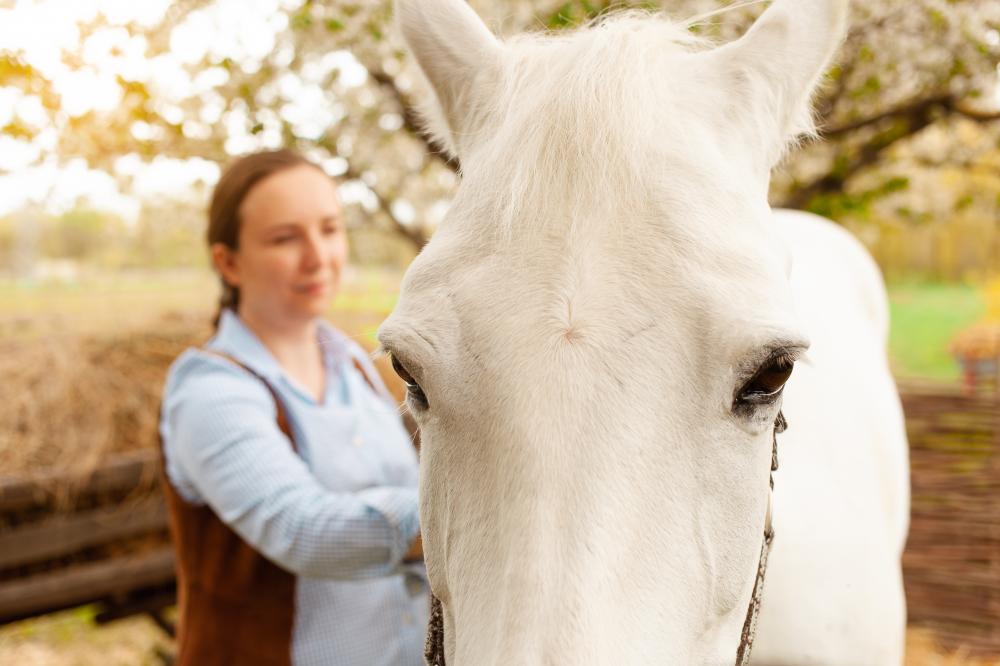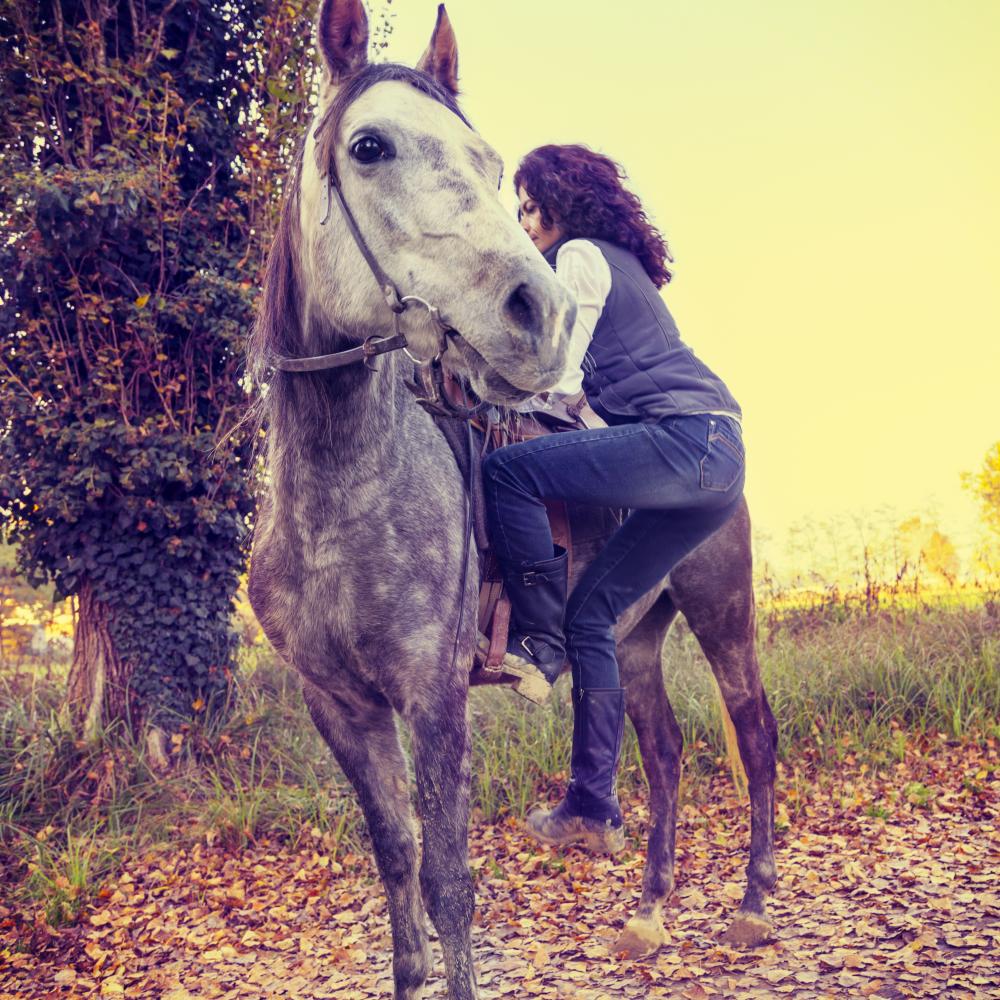Visit Us
Get Directions
With the equine residential treatment centers at Benchmark, seeking help can be simple. Whether you prefer to call us at…

At Benchmark Transitions, we recognize that the path to recovery is unique for every individual. One innovative approach that has shown remarkable results is through equine residential treatment centers, which combine the therapeutic power of horses with residential care.
For nearly three decades, our mission has been to offer hope and healing to those battling addiction and mental health issues. We believe in leveraging the connection between humans and animals to facilitate profound and lasting change.
As we delve into the world of equine-assisted therapy, allow us to guide you through the therapeutic journey that intertwines the nurturing presence of horses with the pursuit of personal growth and recovery.
In the serene settings of equine residential treatment centers, clients find themselves part of a symbiotic relationship with horses. These majestic creatures are not just part of the scenery; they are central to the healing process. Horses possess an uncanny ability to reflect our emotions, enabling individuals to confront feelings in a non-verbal yet impactful manner.
As clients care for and interact with these sensitive animals, they learn valuable life skills such as responsibility, empathy, and the importance of non-verbal communication. These interactions lay the groundwork for deeper self-reflection and emotional growth.
Our residential program offers a sanctuary where individuals can heal alongside these gentle giants, away from the bustle of daily life. It’s here, in the quiet moments of connection, that many of our clients discover a stronger sense of self and purpose.
At Benchmark Transitions, we understand that addiction is a complex disease requiring a multifaceted approach to treatment. Equine residential treatment centers are about more than just time spent with horses; they provide intensive care in a nurturing environment designed to address the underlying causes of addiction and mental health issues.
Under the guidance of experienced therapists, individuals engage in tailored therapeutic activities. These may range from mounted sessions, which can help improve physical health and coordination, to ground-based exercises, where the focus is on building emotional awareness and coping skills.
One of the most powerful aspects of treatment at an equine residential center is the sense of community that blossoms among clients. In this supportive atmosphere, individuals often form bonds with peers who share similar struggles, creating an invaluable network of support.
Through group sessions and shared experiences, our clients not only work on their own recovery but also learn how to support and uplift others. This communal aspect of healing is an essential pillar of the treatment programs at Benchmark Transitions.
Embracing recovery is about more than overcoming substance abuse; it’s about fostering overall wellbeing. In our holistic framework, equine therapy intertwines with other therapeutic modalities, from traditional counseling to innovative wellness practices.
Our approach addresses physical health, psychological resilience, and the spiritual dimensions of healing. Equine residential treatment centers become a haven where individuals can explore various facets of themselves in a safe and controlled environment.
Every individual brings their own story to the treatment center. Our equine therapy programs are designed to honor those stories and facilitate personal growth and empowerment.
Imagine standing beside a horse, brushing its coat to a soft shine, and feeling a swell of pride and capability. These simple acts of care are instrumental in rebuilding self-esteem and fostering a renewed sense of responsibility and accomplishment.
At Benchmark Transitions, we approach each client’s recovery as a unique journey. We know that equine residential treatment centers must cater to a broad spectrum of needs and preferences, and we strive to provide a myriad of options to suit these diverse requirements.
Whether an individual finds solace in the rhythm of a ride or the quiet companionship of grooming, our programs are geared toward finding that unique spark that ignites the passion for recovery and self-discovery.
The practical skills learned in therapy are not confined to the stables; they transfer to everyday life. As clients master tasks like leading a horse or managing its care, they simultaneously develop confidence and problem-solving skills they can apply outside the treatment center.

The lessons learned in the company of horses are often profound, teaching clients about setting boundaries, assertiveness, and the value of mutual respect–vital skills for a successful and sober life.
Recovery is often more sustainable when family members are involved. At Benchmark Transitions, we encourage family participation in the healing process, providing education and therapeutic opportunities for loved ones to engage with their family member’s treatment.
Though equine therapy is a personal journey, it can also strengthen family bonds. We witness incredible moments of connection as families come together, sharing in the therapeutic activities and understanding each other more deeply through the lens of equine interaction.
Witnessing the bond that forms between a horse and a human can be nothing short of transformative. The shared trust and communication pave the way for breakthroughs in therapy, allowing clients to progress in ways they may have never thought possible.
The experiences at equine residential treatment centers are not just about the moments spent in the saddle or the arena. They are about the personal insights gained, the emotional hurdles overcome, and the resilience built each day.
In our years of service, we have seen countless success stories emanate from the stables. We’ve witnessed individuals who arrived feeling broken, leave with a renewed spirit and a sense of mastery over their lives.
It’s in the shared glances with a horse, the gentle nudges, and the quiet companionship where many of our clients find the strength to face their challenges and emerge victorious. These stories are a testament to the healing power of equine therapy and the dedication of our team at Benchmark Transitions.
Equine residential treatment centers are more than just a step in the recovery process; they’re a foundation for a more sustainable, fulfilling life. As we work hand-in-hand with our clients at Benchmark Transitions, we focus on creating a treatment experience that is not only transformative but one that equips individuals with the tools they need for long-term success.
We combine the therapeutic benefits of equine interactions with ongoing support and guidance, ensuring that the journey of healing continues beyond the gates of our treatment center.
At Benchmark Transitions, we stand by the belief that recovery is a lifelong journey. Equine residential treatment centers are a critical part of this journey, providing a unique and powerful path to wellness that honors the individual’s need for connection, growth, and lasting change.
In closing, we invite you to consider the serene, empowering environment of equine residential treatment centers as more than just a means to an end. It is an experience that may very well reshape the course of one’s life, galloping towards a future of health, happiness, and sobriety.

At Benchmark Transitions, we understand that the cost of treatment is a significant consideration for our clients and their families. Equine therapy, as part of our comprehensive treatment programs, can vary in price depending on several factors including the length of the program, the level of care required, and the specific services provided. We work with most insurance plans which can often cover a portion of the costs, and we also have private pay options. It’s best to discuss with our admissions team to understand the full scope of costs and the investment in your or your loved one’s health and recovery.
The ‘best’ equine therapy really depends on the individual and their specific needs. Here at Benchmark Transitions, we tailor our equine therapy programs to align with our clients’ recovery goals. This includes a mix of mounted and ground-based exercises, designed to enhance emotional and physical wellbeing. We believe in matching therapy to the person, not the person to the therapy. It’s essential for the individual to feel a connection with the therapy and the therapists involved, as this is where true healing begins.
Equine therapy offers a unique and powerful dimension to addiction and mental health treatment that many find invaluable. Through the years, we’ve seen remarkable transformations in our clients who engage with our horses. The non-verbal communication and responsibility required in working with these animals can instill confidence, resilience, and self-awareness, which are critical components of the recovery journey. The sense of accomplishment our clients feel tends to affirm that, indeed, equine therapy is worth it. Moreover, the skills and lessons learned often translate into other areas of life, supporting long-term recovery.
Hippotherapy and equine-assisted therapy are often thought to be interchangeable, but they have distinct differences. Hippotherapy, derived from the Greek word ‘hippos’ for horse, is a physical, occupational, and speech-language therapy that utilizes the movement of the horse as a treatment strategy. It is generally conducted by specially trained healthcare professionals. On the other hand, equine-assisted therapy typically refers to a range of treatments that involve activities with horses to promote emotional growth and learning and is often overseen by mental health professionals. At Benchmark Transitions, we provide equine-assisted therapy as a means to address the psychological and behavioral aspects of addiction and mental health issues.
In our years at Benchmark Transitions, we’ve seen that the shared experiences in equine therapy often foster a strong community spirit. As clients work together, facing similar challenges and supporting each other through learning and discovery with the horses, they develop bonds that are key to their individual and collective healing. This sense of belonging and mutual support creates a network that is crucial for lasting recovery. Witnessing clients celebrate each other’s victories and provide comfort during setbacks truly emphasizes the therapeutic value of community.
Equine therapy complements traditional mental health treatments by offering a dynamic and interactive experience outside the confines of an office setting. The horses provide immediate feedback through their reactions, which can help clients become more attuned to their emotions and behaviors. This often leads to breakthroughs that might take much longer in traditional talk therapy. At Benchmark Transitions, we integrate equine therapy with counseling and other therapeutic modalities to offer a holistic treatment approach that addresses the mind, body, and spirit.
The sustainability of equine therapy as part of recovery is rooted in its ability to teach long-lasting life skills. The responsibility of caring for a horse and the mindful presence required to interact successfully with an animal can lead to profound internal changes. Our clients often report that the confidence, mindfulness, and emotional intelligence they develop through equine therapy become embedded in their daily lives, which supports sustainable recovery. Moreover, the memorable experiences and emotional connections made through such therapy often serve as a positive anchor to which clients can return in times of challenge.
National Institute of Mental Health (NIMH): Offers comprehensive information on mental health disorders and a variety of treatment methods, including innovative therapeutic approaches.
National Institute on Drug Abuse (NIDA): Provides extensive research and educational materials on addiction, treatment, and recovery.
Substance Abuse and Mental Health Services Administration (SAMHSA): Offers resources on equine-assisted therapy and other treatment options for substance use and mental health disorders.
Centers for Disease Control and Prevention (CDC): Features information on the health benefits of human-animal interactions.
American Psychological Association (APA): Provides a range of articles on the therapeutic benefits of animal-assisted therapy including equine-assisted therapy.
Professional Association of Therapeutic Horsemanship International (PATH Intl.): A resource for locating certified equine-assisted therapy programs and understanding the benefits of this therapeutic approach.
The HelpGuide: Collaborates with Harvard Health Publishing to provide insight into mental health, including the roles of therapeutic strategies such as animal-assisted therapy.